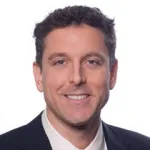
Dr. Geoffrey Abrams is an Associate Professor within the Department of Orthopedic Surgery at Stanford University School of Medicine. He specializes in Sports Medicine/arthroscopy of the shoulder, knee, and elbow, upper extremity joint replacement, as well as tendon and ligament reconstructive surgery of the shoulder, knee, and elbow. He is Board Certified in Orthopedic Surgery, with a subspecialty certificate in Sports Medicine, and is a member of the American Academy of Orthopedic Surgeons (AAOS), the American Orthopedic Society for Sports Medicine (AOSSM), and the American Shoulder and Elbow Surgeons (ASES), among others. He is actively involved in tendon disease research, focusing on the role of microRNA and tendon-derived stem cells in the pathogenesis of the disease. Dr. Abrams has authored or co-authored over 120 peer-reviewed scientific articles, over 30 book chapters, has given numerous invited presentation as well as presented original research at national and international scientific meetings. He serves as Director of Sports Medicine for Varsity Athletics at Stanford University, Head Team Physician for numerous Stanford varsity sports, Assistant Team Physician for the NFL’s San Francisco 49ers, and previous Assistant Team Physician for the NBA’s Golden State Warriors. Dr. Abrams received his undergraduate degree from Stanford University and his Doctor of Medicine from the University of California - San Diego. He completed his residency in Orthopedic Surgery at Stanford University and went on to a Fellowship in Orthopedic Sports Medicine and Shoulder Surgery at Rush University Medical Center in Chicago, Illinois.
Dr. Abrams's research is focused on elucidating the pathobiology behind tendinoapthy and developing new treatment modalities for the disease. Specifically, his team is studying the role of micro-RNA as it relates to chronic inflammation and stem cell differentiation in the development and perpetuation of chronic tendinopathy.
